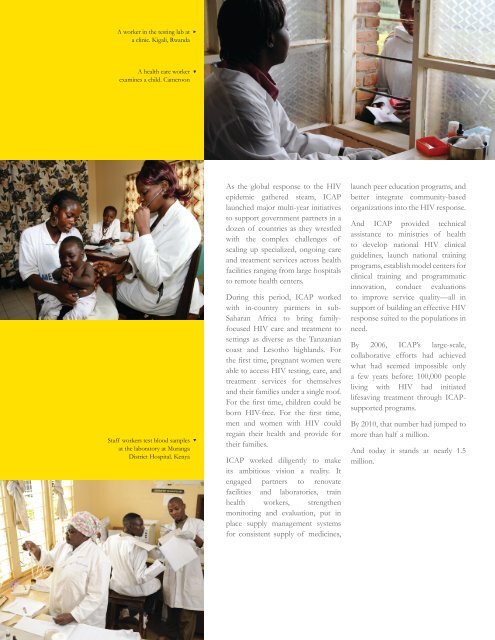ICAP: Empowering Health for 15 Years
This booklet celebrates ICAP's 15th anniversary with beautiful images and major milestones in the organization's history.
This booklet celebrates ICAP's 15th anniversary with beautiful images and major milestones in the organization's history.
Create successful ePaper yourself
Turn your PDF publications into a flip-book with our unique Google optimized e-Paper software.
A worker in the testing lab at<br />
a clinic. Kigali, Rwanda<br />
A health care worker<br />
examines a child. Cameroon<br />
Staff workers test blood samples<br />
at the laboratory at Muranga<br />
District Hospital. Kenya<br />
As the global response to the HIV<br />
epidemic gathered steam, <strong>ICAP</strong><br />
launched major multi-year initiatives<br />
to support government partners in a<br />
dozen of countries as they wrestled<br />
with the complex challenges of<br />
scaling up specialized, ongoing care<br />
and treatment services across health<br />
facilities ranging from large hospitals<br />
to remote health centers.<br />
During this period, <strong>ICAP</strong> worked<br />
with in-country partners in sub-<br />
Saharan Africa to bring familyfocused<br />
HIV care and treatment to<br />
settings as diverse as the Tanzanian<br />
coast and Lesotho highlands. For<br />
the first time, pregnant women were<br />
able to access HIV testing, care, and<br />
treatment services <strong>for</strong> themselves<br />
and their families under a single roof.<br />
For the first time, children could be<br />
born HIV-free. For the first time,<br />
men and women with HIV could<br />
regain their health and provide <strong>for</strong><br />
their families.<br />
<strong>ICAP</strong> worked diligently to make<br />
its ambitious vision a reality. It<br />
engaged partners to renovate<br />
facilities and laboratories, train<br />
health workers, strengthen<br />
monitoring and evaluation, put in<br />
place supply management systems<br />
<strong>for</strong> consistent supply of medicines,<br />
launch peer education programs, and<br />
better integrate community-based<br />
organizations into the HIV response.<br />
And <strong>ICAP</strong> provided technical<br />
assistance to ministries of health<br />
to develop national HIV clinical<br />
guidelines, launch national training<br />
programs, establish model centers <strong>for</strong><br />
clinical training and programmatic<br />
innovation, conduct evaluations<br />
to improve service quality—all in<br />
support of building an effective HIV<br />
response suited to the populations in<br />
need.<br />
By 2006, <strong>ICAP</strong>’s large-scale,<br />
collaborative ef<strong>for</strong>ts had achieved<br />
what had seemed impossible only<br />
a few years be<strong>for</strong>e: 100,000 people<br />
living with HIV had initiated<br />
lifesaving treatment through <strong>ICAP</strong>supported<br />
programs.<br />
By 2010, that number had jumped to<br />
more than half a million.<br />
And today it stands at nearly 1.5<br />
million.


